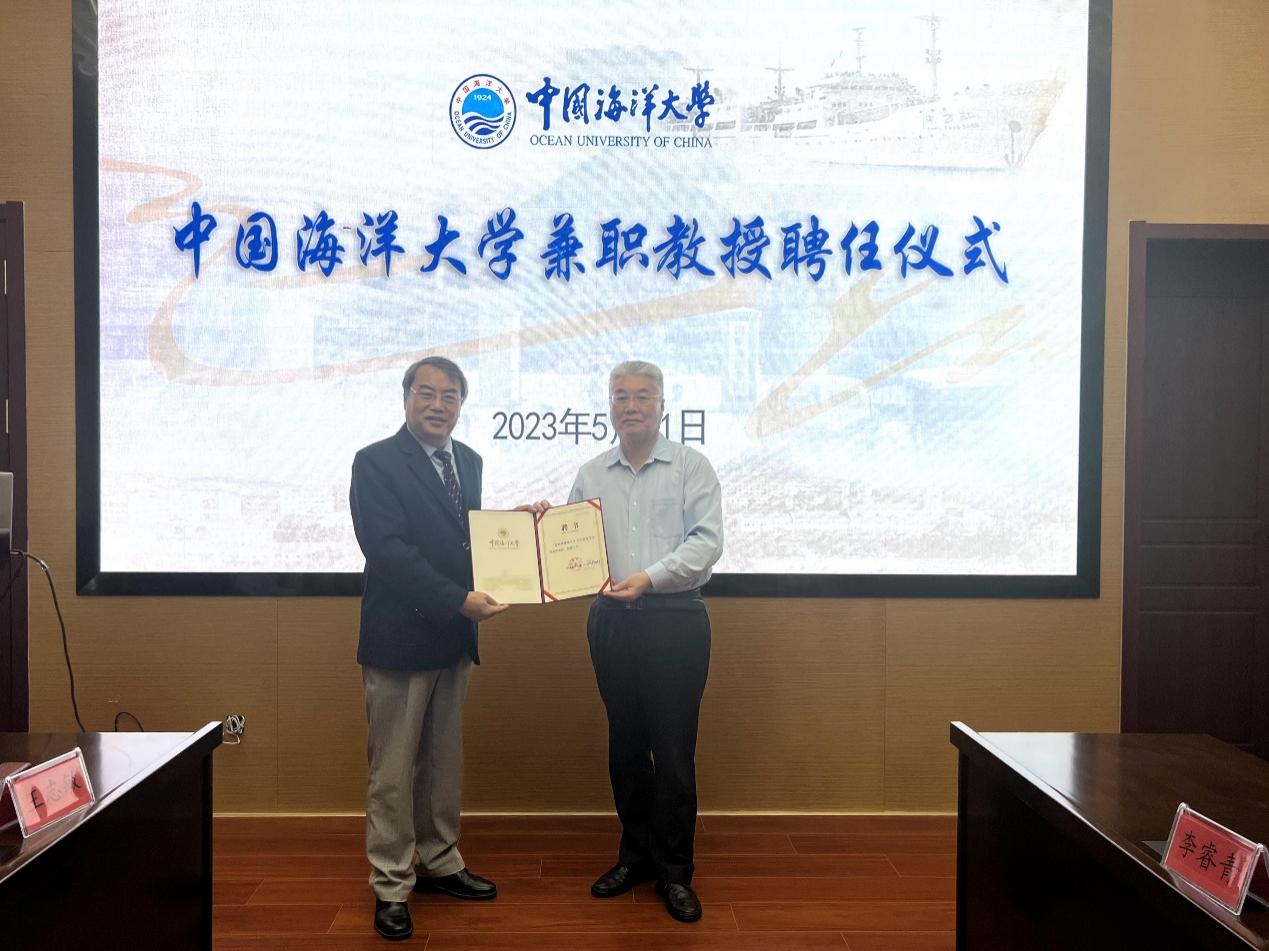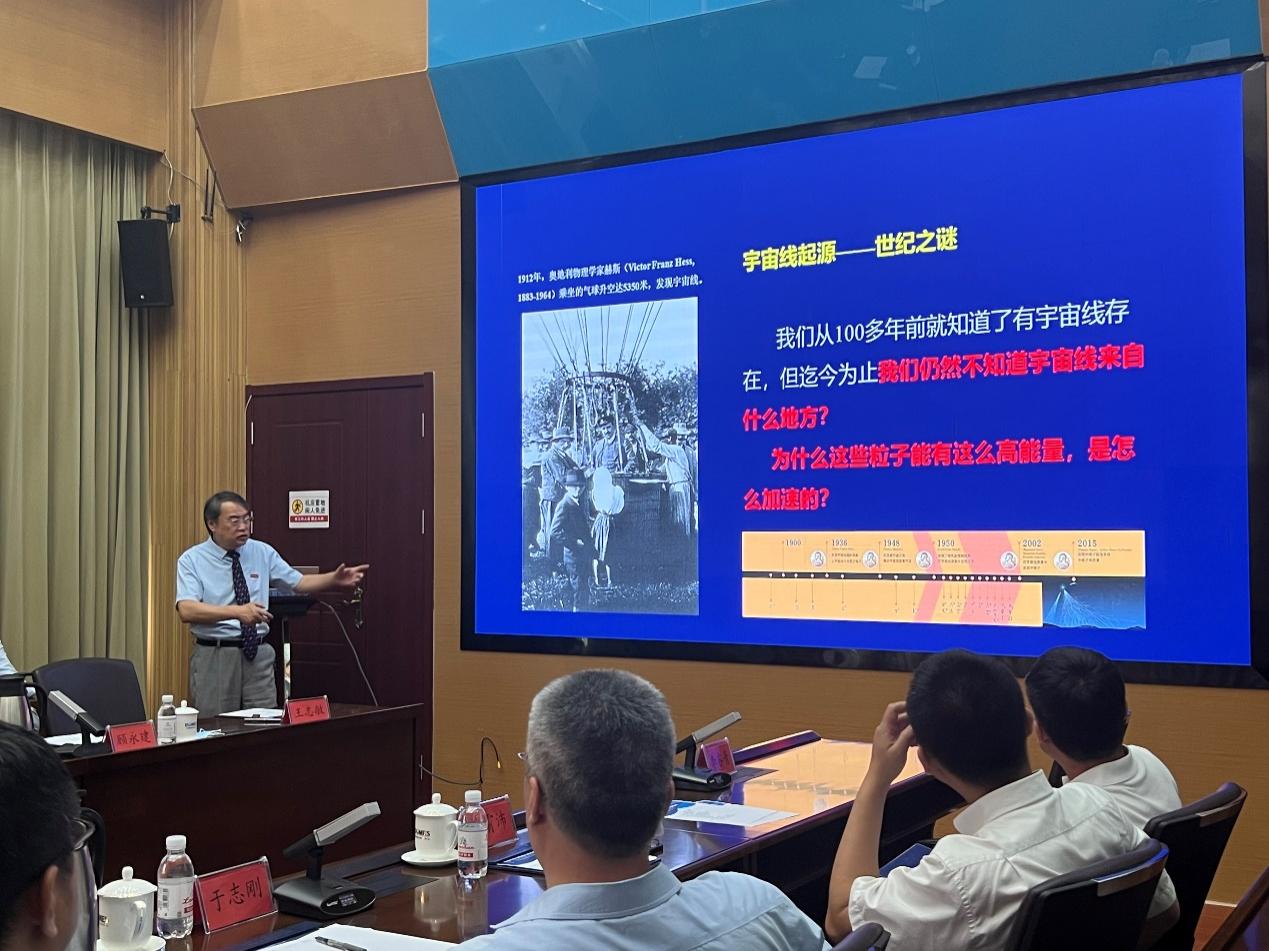On the morning of May 21st, Dr. Cao Zhen, a researcher from the High Energy Physics Institute of the Chinese Academy of Sciences, was hired as a part-time professor at China Ocean University. The ceremony for his appointment and an academic lecture were held in the frontier lecture hall of the Marine Science and Technology Building on campus. President Yu Zhigang, Vice-Director He Xin from the Science and Technology Office, Dean Lin Xiaopei from the School of Marine and Atmospheric Sciences, Dean Dong Junyu and Vice-Dean Gu Yongjian from the School of Information Science and Engineering, and Dean Yuan Guang from the School of Physics and Optoelectronics, together with nearly 100 students and teachers, attended the ceremony. The ceremony was hosted by Vice-Director Li Ruiqing from the Personnel Office.
President Yu Zhigang, representing China Ocean University, warmly welcomed Dr. Cao Zhen and expressed the expectation of having more in-depth collaborations in the future. He emphasized that appointing part-time professors is an important step in strengthening the university's teaching staff, and it is of great significance to accelerate talent cultivation and discipline construction. Afterwards, President Yu Zhigang presented a letter of appointment to Dr. Cao Zhen, and a teacher representative pinned the school badge on him. Dr. Cao Zhen expressed his great pleasure to join China Ocean University and also looked forward to deepening the collaboration with China Ocean University in high-energy cosmic ray observation based on the ocean. He expressed his desire to contribute as a professor at China Ocean University in the area of talent cultivation.After the appointment ceremony, Professor Cao Zhen gave a Academic Report titled "Catching High-Energy Messengers and Exploring Cosmic Mysteries". He elaborated on the construction process and multiple innovative breakthroughs of the LHAASO project, and highlighted several influential research achievements worldwide that were achieved with the experimental data obtained by LHAASO. During the interactive session, Professor Cao Zhen provided comprehensive answers to the enthusiastic questions from the students, and the atmosphere was lively.



Researcher Cao Zhen's Profile:
Cao Zhen is a researcher at the High Energy Physics Institute of the Chinese Academy of Sciences and the chief scientist of the national major scientific facility "LHAASO, a High-Altitude Cosmic Ray Observatory". He was born in Kunming in September 1962 and graduated from the Department of Physics at Yunnan University in July 1982. He obtained his PhD in philosophy of high-energy physics from the High Energy Physics Institute in 1994. In 1994, he served as a research assistant at the Department of Physics, University of Oregon, USA, and in 1998, he was a research assistant at the Department of Physics, University of Utah, USA. He became an associate professor at the University of Utah from 2003 to 2009. In 2004, he was selected as a member of the "Introduction of Excellent Foreign Talents (Century Plan)" of the Chinese Academy of Sciences and became a researcher at the Particle Astrophysics Center of the High Energy Physics Institute, as well as a doctoral supervisor. Since 2013, he has served as the chief scientist and project manager of the LHAASO project. In 2015, he was selected as a Distinguished Researcher of the Chinese Academy of Sciences. He is currently a professor on duty at the University of Chinese Academy of Sciences. Since 2019, he has served as the director of the "Tianfu Cosmic Ray Research Center" at the High Energy Physics Institute. He also gets the special allowance of the State Council. Since 1994, he has been active in the field of cosmic rays and gamma-ray astronomy both domestically and internationally, participating in multiple well-known cosmic ray experiments and leading and designing multiple large-scale experiments and their detection devices, as well as overseeing their development. He has achieved multiple important results and published over 120 scientific papers in international professional journals including Science and Nature, with a total citation rate exceeding 5,500 times. Since 2007, he has served as a member of the Standing Committee of the High Energy Physics Branch of the Chinese Physics Society. He was also a member of the Particle Astrophysics Committee (C4) and the Particle Astrophysics International Committee (WG10) of the International Union of Pure and Applied Physics (IUPAP).
Correspondent: Fan Xuan

